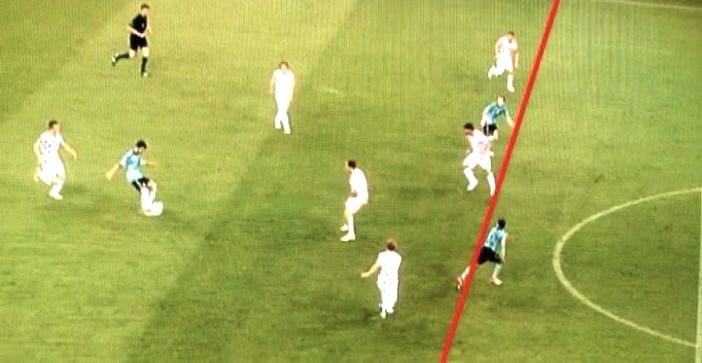Recently, FIFA, the international governing body for soccer, has given its approval to a new offside law that is set to revolutionize the game. Under this groundbreaking change, the entire body of the attacking player must be positioned in front of the defender for an offside offense to be called. This rule adjustment has caused quite a stir among soccer enthusiasts and is poised to have a significant impact on the sport. In particular, nations such as the Netherlands, Italy, and Sweden have already expressed their intention to implement this new rule in their respective leagues.
Traditionally, determining offside in soccer has been a contentious issue, often leading to heated debates among fans, players, and officials. The existing rule stated that a player was offside if any part of their body, excluding their arms, was ahead of the last defender when the ball was played to them. This often led to ambiguous situations where players' arms or shoulders, which played no role in the game, became focal points for decisions. The introduction of the new offside law aims to simplify the decision-making process and provide greater clarity on offside calls.
Under the revised rule, an attacking player can only be deemed offside if their entire body, from head to toe, is located ahead of the last defender at the precise moment the ball is played. This change means that even if a player's shoulder or arm is positioned slightly beyond the defender, they will not be considered offside as long as the rest of their body remains behind. This adjustment introduces a more objective standard for determining offside, reducing the reliance on subjective judgment calls and potentially reducing the number of contentious decisions.
The decision by the Netherlands, Italy, and Sweden to implement this new offside law showcases their commitment to embracing progressive changes in the game. These nations have long been known for their rich soccer traditions and have produced some of the sport's most iconic players. By adopting this rule, they are setting a precedent for other leagues and countries to follow suit, further contributing to the evolution of the sport.
The implications of this new offside law extend beyond the professional level. Lower-tier leagues, youth competitions, and grassroots soccer will also be affected by this rule change. Aspiring young players will need to adapt their playing styles and tactics to align with the new criteria for offside. Coaches and trainers will have to incorporate this adjustment into their teaching methodologies, ensuring that players understand and apply the revised rules effectively.
Critics of the new offside law argue that it could potentially lead to an increase in the number of goals and diminish the significance of defensive strategies. They contend that by allowing attackers to position themselves closer to the goal without being offside, defenders will face increased challenges in maintaining a cohesive defensive line. However, proponents of the rule change argue that it will enhance the attacking aspect of the game, encouraging more goal-scoring opportunities and thrilling displays of skill.
Additionally, the implementation of the new offside law is expected to impact the role of technology in officiating matches. The use of video assistant referee (VAR) systems has gained prominence in recent years, with officials relying on video replays to make crucial decisions. With the revised offside rule in effect, VAR technology will play an even more significant role in determining offside incidents, as millimeter-precise analysis may be required to ascertain whether an attacker's entire body was in front of the defender.
In conclusion, FIFA's approval of the new offside law, requiring the entire body of the attacking player to be ahead of the defender for an offside offense to occur, marks a significant development in the world of soccer. The decision by nations like the Netherlands, Italy, and Sweden to implement this rule showcases their commitment to embracing progressive changes in the game. While the impact of this rule change remains to be seen, it is




No comments yet
Be the first to share your thoughts!